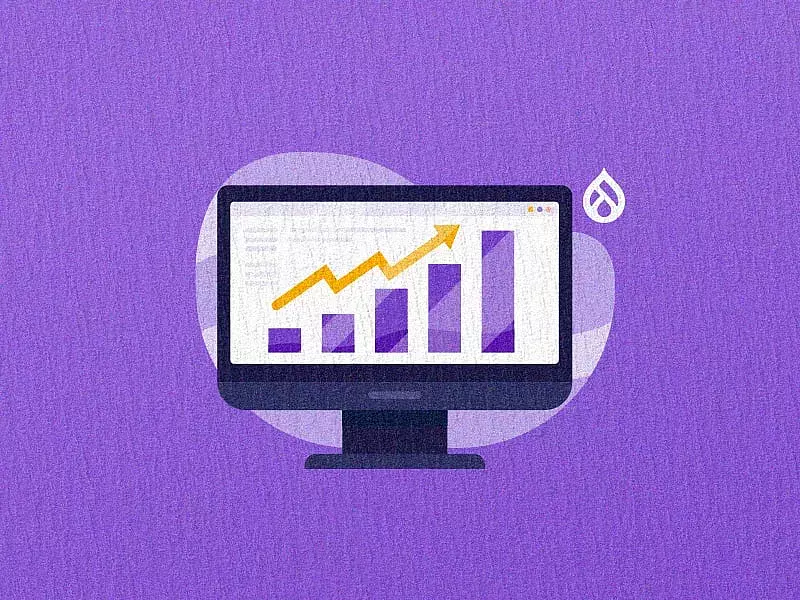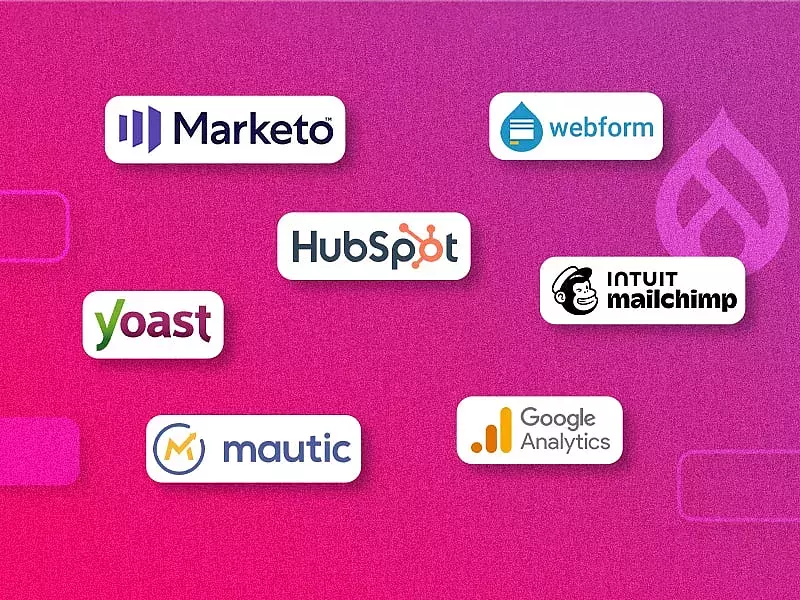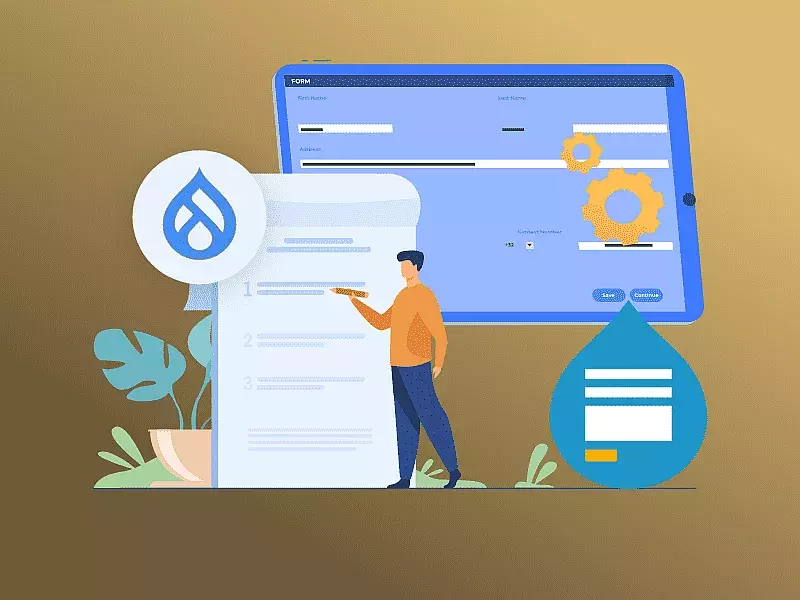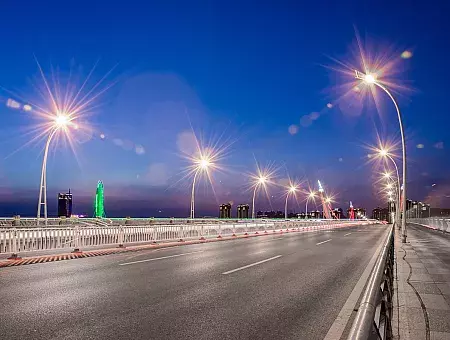Table of contents
Did you know, on an average an adult makes about 35000 decisions each day?! And suddenly, life feels more difficult. Most are mundane but taking the right step towards an important decision can turn you into a winner. Since the release of Drupal 8 in November 2015, Drupal website owners have been in a dilemma. To upgrade or not to upgrade. To migrate to Drupal 8 now or simply wait till Drupal 9 releases and completely skip 8. And to make things more knotty, there are PHP, Symfony and other version upgrades to keep track of too.
At this point, you might wonder why choose or stick with Drupal at all when everything seems so complex and tedious. Why shouldn’t I just switch to a rather simpler CMS where I can sit back and just let my content work its magic, you ask? Here’s the thing – Drupal is an open-source content management framework that is best known for the security, robustness and flexibility it offers. Without constant and consistent updates and patches, Drupal wouldn’t have been the relevant, dependable and trusted CMS that it is today. This continuous innovation approach has helped Drupal in offering new Drupal features, advanced functionalities and security patches with every minor release.
Drupal’s Plan of Action
Few months ago, during his keynote, Dries announced (and wrote) about Drupal’s structured release schedule. Although this clarity gave much relief to many, it also sent some of our Drupal 7 clients in a frenzy.

Taken from https://dri.es/drupal-7-8-and-9
Optimistically, Drupal 9 releases in June 2020. The initial plan, however, was to release it in December 2020 but that would give website owners only 12 months to migrate to Drupal 9. Hence it was decided that it would be best to have an 18-month window at the least or a smooth migration. Drupal 8 support will end in November 2021.
Drupal 7 was expected to reach end-of-life by November 2020 initially but since several websites might still be running on Drupal 7 even by 2020, the community has decided to extend support to Drupal 7 till November 2021. Which means that both - Drupal 7 and Drupal 8, will reach end-of-life at the same time!
The Dependence
I believe PHP and Symfony are the heart and soul of Drupal. Every move Drupal makes depends on the release cycles of these two significant elements. Symfony releases a new minor version every six months and a major version every two years. In order to be compatible with Symfony’s releases, Drupal has timed its minor releases one month after every Symfony release. Because Drupal 8 depends on Symfony 3, which has an end-of-life in Nov 2021, Drupal 8 HAS TO end-of-life by Nov 2021.
Security Support for PHP version 5.x and 7.0 have ended in December 2018. While Drupal websites can still continue to run on older PHP versions, upgrading the PHP version will not only receive active community support but also immensely improve site performance. Dries recommends updating the website’s PHP version to at least PHP 7.1 and ideally to PHP 7.2 (supported by Drupal 8.5). The latest PHP version 7.3 will be supported by Drupal 8.7 which is scheduled to be released by May 2019.
So, why migrate my Drupal 7 websites to Drupal 8 now instead of simply migrating to Drupal 9?
I concur. This is an extremely valid query which makes total sense. Yes, you can completely skip Drupal 8 and migrate to Drupal 9 before Drupal 7’s end-of-life (Nov 2021). If you plan to hang on to Drupal 7 till then, you have to make sure you update your PHP versions for better support and optimized performance. You could also hire a vendor who will provide you with a Long Term Support (LTS) for your Drupal 7 website beyond its end-of-life.
Although, there are a few advantages of migrating to Drupal 8 now.
-
Easy upgrade to Drupal 9
– For best performance of your Drupal website, it is always recommended to stay up-to-date with Drupal’s version upgrades. Drupal 8’s minor version upgrades are as easy as pie – no rebuild needed. And Drupal 9 is going to be very similar to Drupal 8’s last minor version while removing any deprecated code and updating any third-party dependencies. So migrating from Drupal 8 to Drupal 9 is just going to be like any minor release upgrade. Also, the great news is that starting from Drupal 8, all major upgrades will not require a rebuild of the entire website – a super smooth upgrade and learning curve.
-
Contributed Modules Compatibility
– Yes, Drupal 7 has the most number of contributed modules. Drupal 8, however, has most of the popular and high-performing modules in core already. And the community has promised to make contributed modules compatible with both Drupal 8 and Drupal 9 as long as they do not use any deprecated APIs.
-
You don’t have much time!
Although Drupal 7 and Drupal 8 both end-their-lives (pun intended) at the same time on November 2021, it does not mean you have three years more to migrate (From Drupal 7). You can only start migrating to Drupal 9 after June 2020 –which gives you about 18 months only. And we all know, migrating complex websites take much more time and effort than that. For a smooth transition, we recommend starting your migration process to Drupal 8 now so upgrading to Drupal 9 can be easy and fast. After all, only someone who is well prepared has the opportunity to improvise – Ingmar Bergman
Mark your calendars!
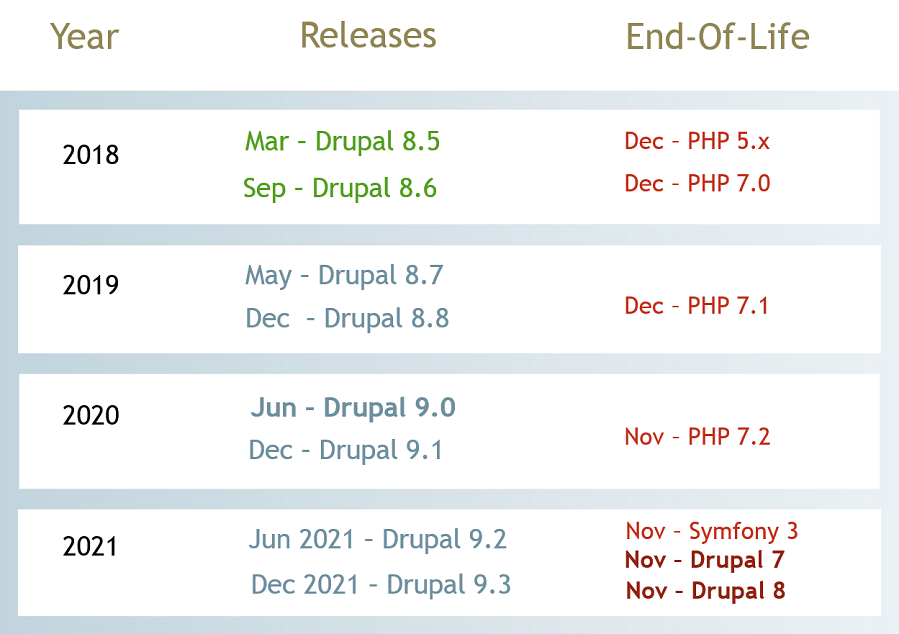
Like everything else, Drupal too has evolved over the years and now has an extremely structured roadmap that can help tackle most of its obvious obstacles. With every release, Drupal is getting better while embracing its past and deprecating those outdated/unsecure elements. Drupal isn’t competing with anyone but itself – trying to outdo its past with every minor/major upgrade release. To upgrade to Drupal 8 now from Drupal 7 or to wait till Drupal 9 is out, is really a choice site owners need to make depending on their business goals, website complexities, budget and time constraints. Specbee is a Drupal development company and our Drupal experts can help you make a better decision.

